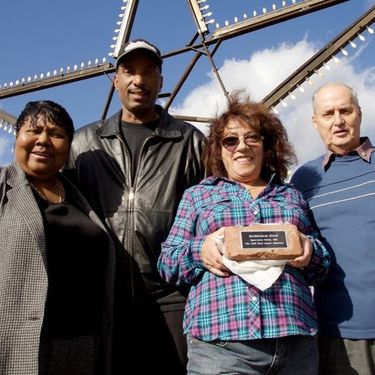
Prof. Huimei Liu
Sessions auxquelles Prof. Huimei Liu participe
Mardi 7 Juin, 2016
Extant scholarly literature has been documented on heritage and tourism. However, the strong links between heritage and leisure, a broader concept than tourism, have long been neglected. The notion of heritage has pervaded in a variety of humanities-related fields, among them is leisure, which demonstrates the lived experience of locals, and provides indispensible meanings and identity for communities and individuals. And both heritage and leisure root themselves into cultural fabrics of soci...
Sessions auxquelles Prof. Huimei Liu assiste
Vendredi 3 Juin, 2016
This forum will explore the current directions of critical heritage studies and what makes ACHS distinctive. Panel members will discuss what the term critical means to them, and what directions they would like to see develop in the future. To help develop an open dialogue, the session will also give considerable time to contributions from the audience.
Welcome addresses and cocktail, followed by the Concordia Signature Event "The Garden of the Grey Nuns". As the opening ceremony and cocktail take place in the former Grey Nuns' Motherhouse, recycled into campus residence and reading rooms by Concordia University, delegates will also have the possibility to discover the video Three Grey Nuns (3 minutes, by Ron Rudin and Phil Lichti. Three Grey Nuns recount their memories of communal life in the Grey Nun’s Motherhouse. Built...
Working with archival documents and the current-day morphology of the Grey Nuns' site, Dr Cynthia Hammond, Dr Shauna Janssen, in collaboration with Dr Jill Didur, will curate a series of installations and performances that speak directly to the rich heritage of a specific urban landscape: the gardens of the Grey Nuns' Motherhouse, now part of the Concordia University downtown campus. Visitors will have the opportunity to explore the lost working gardens of the Grey Nuns. As with other such...
Samedi 4 Juin, 2016
What if we changed our views on heritage? And if heritage has already changed? While, on the global scene, states maintain their leading role in the mobilization of social and territorial histories, on the local scale, regions, neighbourhoods and parishes have changed. Citizens and communities too: they latch on to heritage to express an unprecedented range of belongings that no law seems to be able to take measures to contain, often to the discontent of...
Since the beginning of the 19th century religious buildings and artefacts of the West have been involved in a continuous process of musealization. In the time-period subsequent to the Second World War, the general forces of secularisation increasingly turned religious buildings, most of them churches, into heritage and substantial parts of Christian practices into history. On a global scale (Western), conservation and heritage practices have been applied on tangible and intangible expressions...
Much is being made of the perceived breakdown of the nation-state, which was historically configured as a “container” of heritage formations, adopting and perusing local traditions where possible but oppressing them where deemed unsuitable. Migration is seen as eroding the rigid boundaries of this configuration, potentially liberating identities and heritages in the process. This session addresses the relationship between critical heritage and redefinitions of self, other, community and place...
Industrial heritage in Britain has tended to be romanticised in museum ‘cathedrals’ and ‘theme parks’ (like Beamish), with workers’ lived experience subordinated to the machines, buildings and physical artefacts that dominate these spaces. Here workers’ lives are more often than not celebrated rather than critically reconstructed and interpreted. The politics, class relations and struggle, violence, poverty and murkier side of working life is increasingly being neglected as the past is san...
Most of what we experience as heritage emerges into conscious recognition through a complex mixture of political and ideological filters, including nationalism. In these processes, through a variety of devices (museums, scholarly research, consumer reproduction, etc.), dualistic classifications articulate a powerful hierarchy of value and significance. In particular, the tangible-intangible pair, given legitimacy by such international bodies as UNESCO, reproduces a selective ordering of cul...
Dimanche 5 Juin, 2016
(In English) Chinatown, born in the second half of the 19th century, is a hub of commercial and sociocultural activities which showcases Chinese culture in Montreal. It has become, over time, an iconic landscape of the city’s cultural diversity. Jonathan Cha, urbanologist, landscape architect and doctor in both space and town planning, proposes a discovery tour allowing us to get acquainted with the history of the district and the decipherment of its landscape. _ Le Quartier chinois, né dans ...
We would like to propose a session, building on the one we ran at the 2014 CHS conference in Canberra, on how emotion and affect feature in the fields of heritage and museums studies, memory studies, public history, heritage tourism, studies of the built and urban environment, conservation, archives and any field of study that deals with the emotional impact and use of the past in the present. There is an increasing interest in how emotion is a form of judgement on things that affect ou...
"What does heritage change?" is a multifaceted question to which the answer(s) are in primary respects related to real-life negotiations among different groups of citizens, cultures, races, ethnic groups, sexual identities, and social classes about received, official and/or widely accepted or accomodated intangible attributes, cultural traditions, historic monuments, buildings, and other transmitted or revived historical legacies. Heritage designated by and for whom, for what motivations, an...
Lundi 6 Juin, 2016
Canal: Walking the Post-Industrial Lachine Canal (COHDS, 2013 - bilingual) is an audio-walk and booklet that takes listeners from the Atwater Market to the Saint Gabriel Lock, exploring the post-industrial transformation of a once heavily industrialized area. The Lachine Canal area has undergone dramatic changes, as mills and factories were closed and then demolished or converted into high-end condominiums. The adjoining working-class neighbourhoods ...
As Canada shifts from a resource-based economy to a knowledge-based economy, small communities that were established to service the primary sector are faced with a complex and unique set of challenges. They are communities built on a culture of hard work, resourcefulness, and creativity; their residents are now tasked with developing strategies to deal with a lack of employment, depopulation and resettlement. Small is premised on the notion that leveraging the rich cultur...
Le patrimoine fait aujourd’hui l’objet d’attentions autant que d’agressions et de destructions. Cela peut s’expliquer par les difficultés de son identification ou de sa conservation. Cela peut plus profondément s’expliquer parce que, dès le départ, il célébre un événement ou conserve une mémoire qui peut être ou devenir une source de dissenssions et de conflits politiques. Enfin, sa reconnaissance suscite des gains économiques pour les uns mais des pertes pour les autres. Mais peut-être...
To celebrate our film series dedicated to heritage, sponsored by the Department of American Studies at the University of Maryland and the United States Chapter of the Association of Critical Heritage Studies, this event will spotlight the iconic Sugar Shack, which is rooted from Quebec to New-England and which is both the place of maple syrup production and of friendly gatherings during the maple syrup season. In a festive atmosphere, delegates will be invited to taste one of the essential of...
Directed by William Shewbridge and Michelle Stefano USA; 35 mins Presented by Michelle Stefano ___ After 125 years of operation, the Sparrows Point Steel Mill (Baltimore, Maryland) finally closed its doors in 2012. The film, “Mill Stories”, examines the importance of the mill from the perspectives of former workers and community members while connecting their story to the larger narrative of industrial boom and bust. The film seeks to amplify the voices of forme...
Mardi 7 Juin, 2016
We would like to propose a session, building on the one we ran at the 2014 CHS conference in Canberra, on how emotion and affect feature in the fields of heritage and museums studies, memory studies, public history, heritage tourism, studies of the built and urban environment, conservation, archives and any field of study that deals with the emotional impact and use of the past in the present. There is an increasing interest in how emotion is a form of judgement on things that affect ou...
The closing dinner of the conference, called “Pawâ” according to a French-Canadian tradition borrowed from the Native American lexicon, will be an opportunity to discover, in the heart of the Old Port of Montreal, an original culinary creation by the caterer Agnus Dei, from the renowned Maison Cartier-Besson in Montreal, leader in its field for its boundless creativity and event expertise. The dinner, in the form of stations, will offer delegates an exploration of Quebecois culinary heritage,...












